Blooming partnerships. A new season of M.A.R.K.E.T. Meet-Ups at SEEU
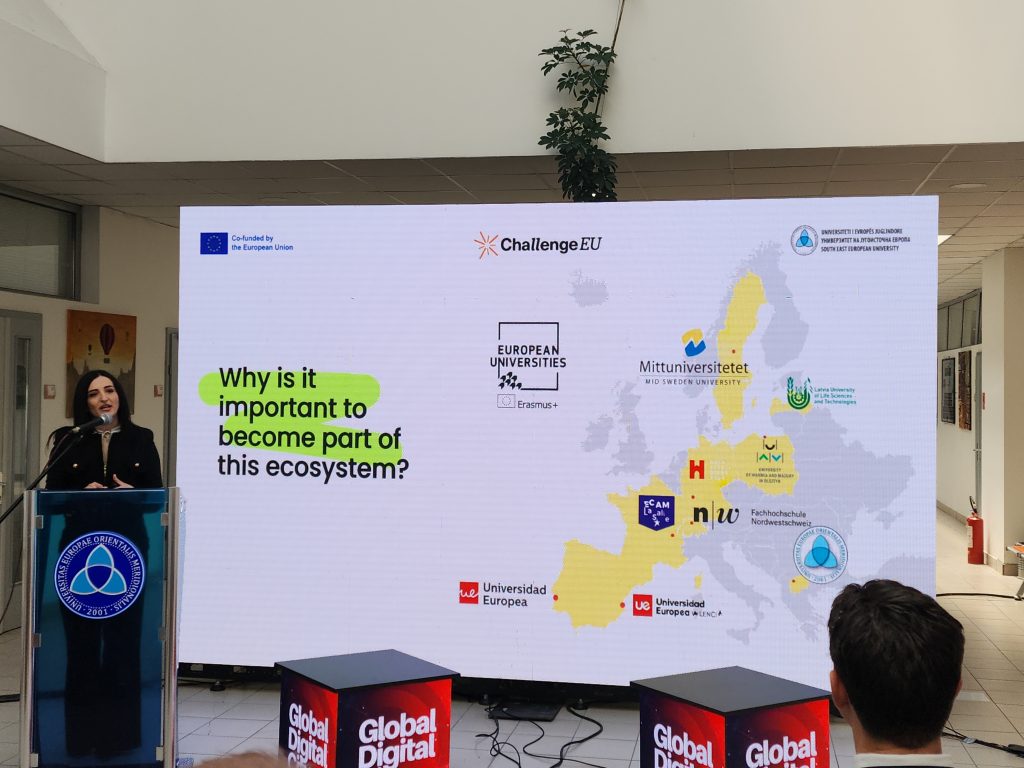
The second day of the Global Digital City event took place at South East European University (SEEU), with the support of ABSL North Macedonia, bringing together key representatives from academia, industry, the diplomatic community, and public institutions. The activities followed the M.A.R.K.E.T. Meet-Up approach of the ChallengeEU Alliance, creating an interactive environment where collaboration moved beyond dialogue toward practical engagement. The event strengthened connections between universities, businesses, policymakers, and young professionals, encouraging the co-creation of innovative solutions. During the keynote session, Assoc. Prof. Dr. Shpresa Alija, Market Officer of the ChallengeEU project, presented the initiative’s strategic vision for developing a digital collaboration platform and a sustainable innovation ecosystem. She highlighted how ChallengeEU bridges academia and industry by mobilising students, leveraging academic expertise, and engaging international partner universities to transform real-world challenges into concrete collaborative projects. Hamit Kamberi, designer of the first digital platform developed within the ChallengeEU framework – Impact Lab – then introduced the platform, outlining its key features, benefits, and the stakeholder registration process. He emphasised that Impact Lab serves as a new digital collaboration space connecting universities, industry, and partners at both regional and international levels. The programme concluded with practical workshops and training sessions focused on employability and industry readiness, providing participants with hands-on experience and direct interaction with experts and employers. The event clearly demonstrated how M.A.R.K.E.T. Meet-Ups generate tangible results by turning ideas into action and strengthening long-term partnerships across the broader European ChallengeEU alliance.
M.A.R.K.E.T. Meet-Up on Distance Campus strengthens regional collaboration for MIUN in Östersund
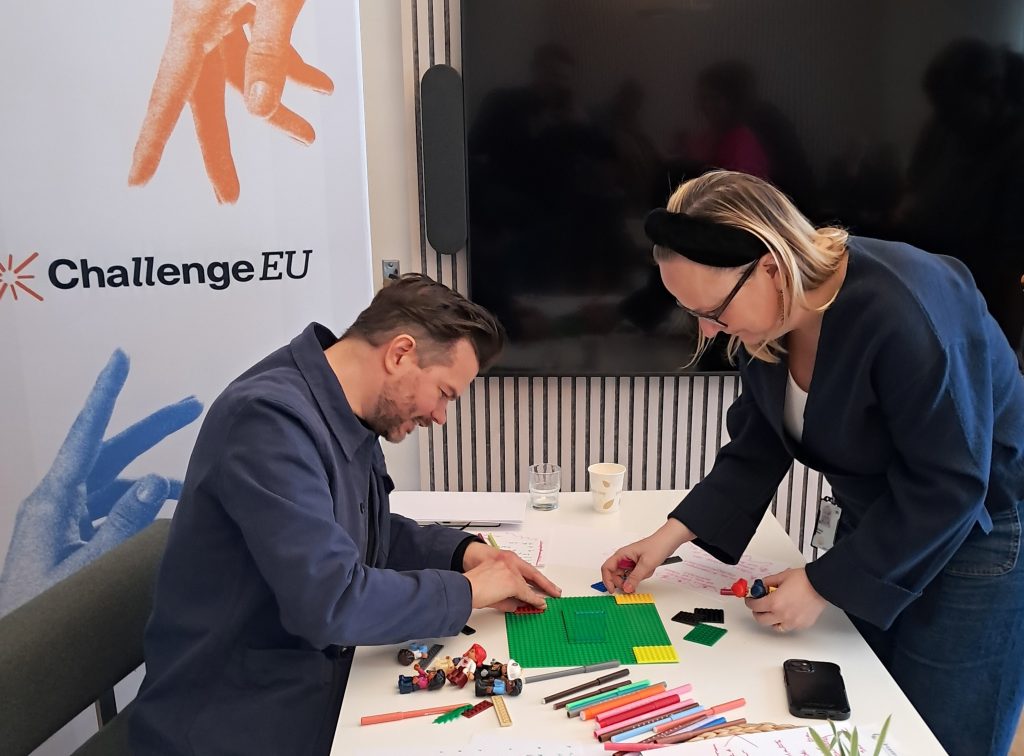
On 24 February 2026, Mid Sweden University and ChallengeEU hosted a M.A.R.K.E.T Meet-Up on the continued development of the distance campus together with Lärcentrum Östersund (Östersund Adult Education Centre). Around 20 participants gathered, representing the public sector, the business community, civil society, and academia. The Distance Campus is a physical space where distance students can study, connect with peers, and network with potential future employers. The meeting provided a valuable and up-to-date overview of the current status of the Distance Campus, which is hosted by Lärcentrum Östersund. Participants also had the opportunity to hear directly from distance students who actively use the facilities, offering important insights into their study conditions and everyday needs. During a well-received facilitated workshop, the group identified key challenges and areas for improvement related to the further development of the Distance Campus and the study environment for distance learners in the Jämtland/Härjedalen region. The discussions enabled participants to exchange ideas, experiences, and expertise, and to outline potential actions with clear regional relevance and impact. Distance students living in the region are increasingly recognised as an important part of the regional talent supply for both the business and public sectors. The event confirmed strong engagement among regional stakeholders and marked an important step forward in strengthening collaboration to create sustainable and supportive conditions for distance students.
Student Journal: “ChallengeEU did more than connect universities”
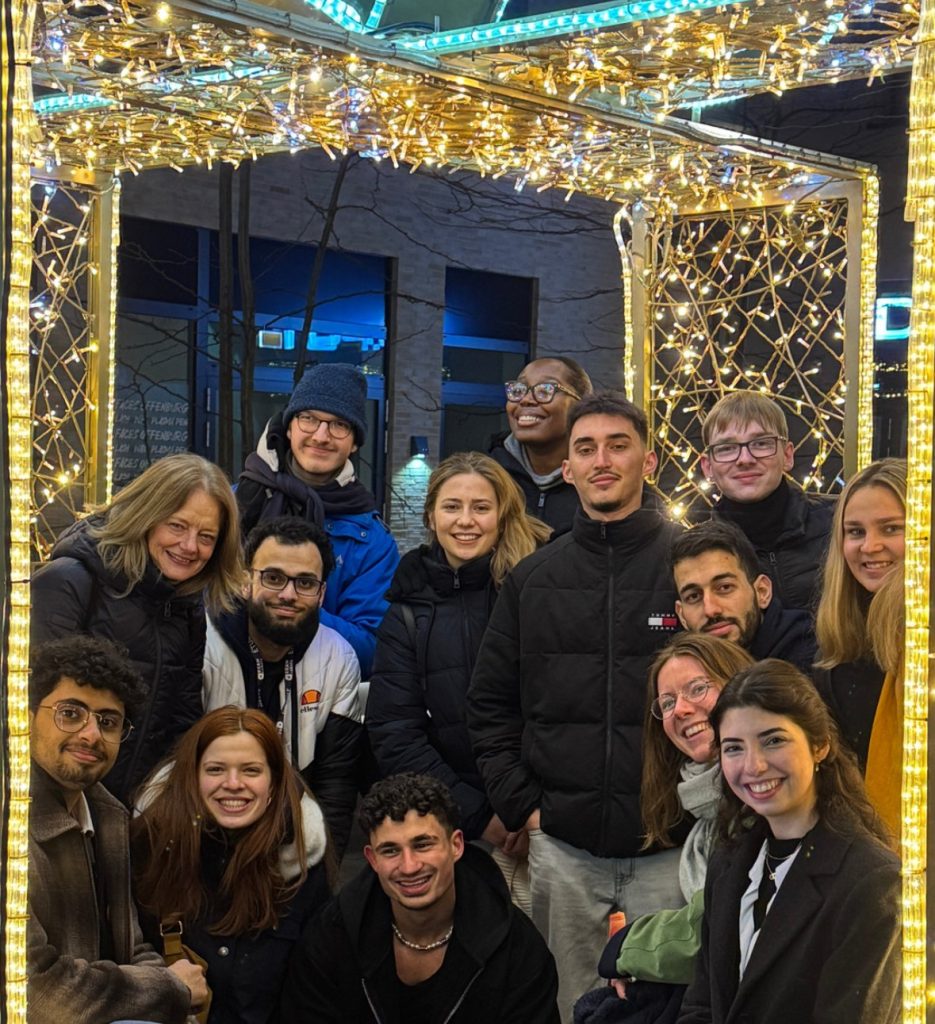
“Being part of this journey changed the way I see Europe” – writes Gajur Memeti from South East European University in North Macedonia, a member of the Student Ambassadors Team. Representing South East European University as a Student Ambassador for ChallengeEU honestly started as something that simply made me proud. I remember when I first got the role. It felt big. Not just because it was connected to Europe, but because I knew I was carrying the name of my university with me. That realization alone made it feel important. At the beginning, everything was online. We met through screens, squares with names and faces from different countries. Even though it was virtual, there was still this shared excitement. I would sit at my desk listening to students from different parts of Europe speaking about their ideas, their universities, and their expectations. It was strange in a good way, realizing how different we all were, but also how similar our goals sounded. Still, online meetings can only go so far. You connect, but it stays limited. Then December 2025 came, and we finally met in person in Offenburg. That is when everything felt real. Traveling there was not just about attending a meeting. It felt like stepping into something bigger. We had workshops on content creation, photography, and intercultural communication, and those sessions were genuinely useful. I learned practical things. How to communicate better. How to represent something visually. How to think more carefully about the way I share stories. But if I am being honest, the most important part was not inside the workshop rooms. It was the conversations in between. The small talks that slowly turned into deeper discussions. Sharing meals, laughing about cultural differences, explaining traditions, talking about our studies and our ambitions. In just a few days, the dynamic completely changed. We stopped feeling like representatives of nine separate universities and started feeling like one team. What surprised me the most was how fast the connections felt real. We arrived as ambassadors with a title. We left feeling like we had built something personal. Looking back now, I realize that ChallengeEU did more than connect universities. It connected perspectives. It challenged the way I think about borders, collaboration, and leadership. It showed me that real impact does not begin with institutions. It begins with people who are willing to listen, to share, and to grow together. Being part of this journey changed the way I see Europe. It is no longer just a map or a concept discussed in classrooms. It is people, conversations, shared goals, and mutual respect. What started as an honor became something deeper. A responsibility I carry with pride. A reminder that when young people come together with openness and purpose, the future does not feel uncertain. It feels ours to shape. Gajur Memeti
Neurodiversity in focus: ChallengeEU workshop in Offenburg
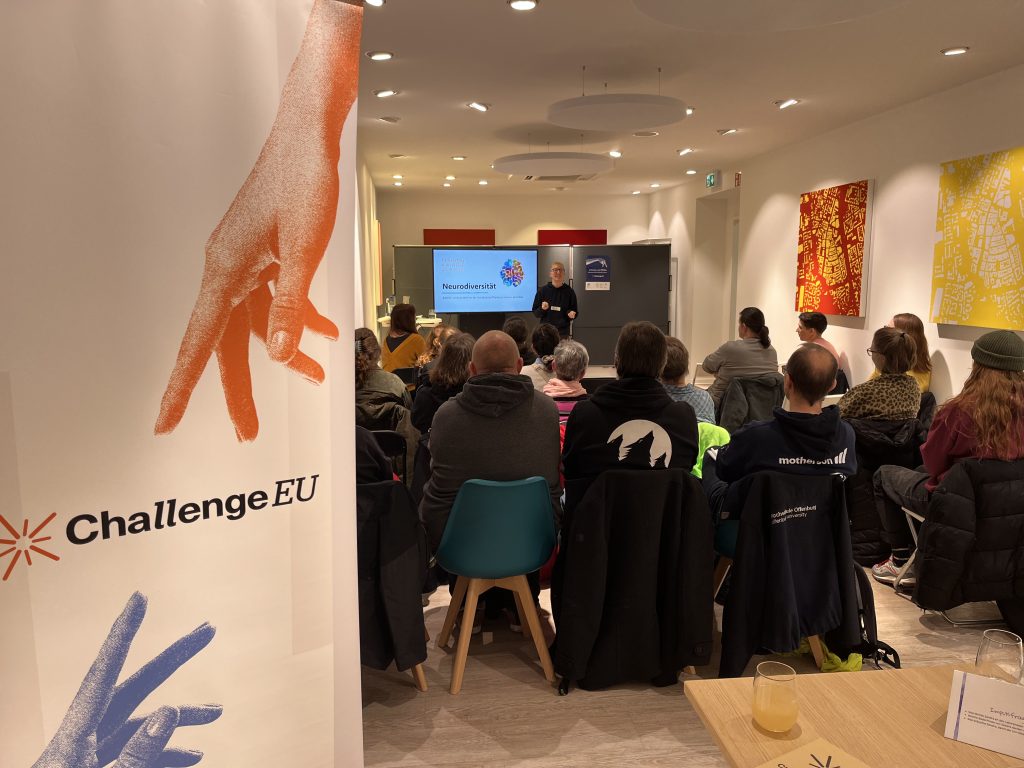
On 12 February, the first neurodiversity-focused workshop of the ChallengeEU alliance took place at Stadtraum Offenburg, bringing together the M.A.R.K.E.T. approach and ODEI principles (Openness, Diversity, Equity, Inclusion). The event became an inspiring platform for exchanging experiences among academics, students, institutional representatives, and external practitioners. The programme was led by neurodiversity expert Sylvia Drews. The workshop opened with an introduction to neurodivergence in the workplace, including how traits such as ADHD and autism spectrum conditions may present differently in individuals. Participants explored core patterns of neurodivergent functioning as well as the challenges neurodivergent people face in professional and educational environments. A strong emphasis was placed on interaction. Working in groups, participants collaboratively developed ideas for creating more inclusive spaces that genuinely support neurodivergent individuals. Discussions addressed both workplace settings and educational institutions, highlighting that inclusive solutions can – and should – be implemented at multiple levels. An important part of the meeting was reflection on practical steps that can be taken in organisational policies and everyday practices. The aim was to identify actions that help build safe environments where everyone can express themselves freely and confidently, without fear of judgment. The workshop demonstrated how ChallengeEU creates spaces where diverse perspectives meet: academic knowledge, student voices, institutional experience, and expert practice. Bringing these groups together in one room makes it possible to move beyond dialogue toward shared responsibility for inclusive transformation. Participants highlighted the inspiring atmosphere of the event and the value of meaningful exchange and collaboration. The workshop also provided an opportunity to connect these discussions with ChallengeEU’s mission – encouraging unconventional thinking, collective action, and challenging the now, in unity.
UWM Regional Meet-Up
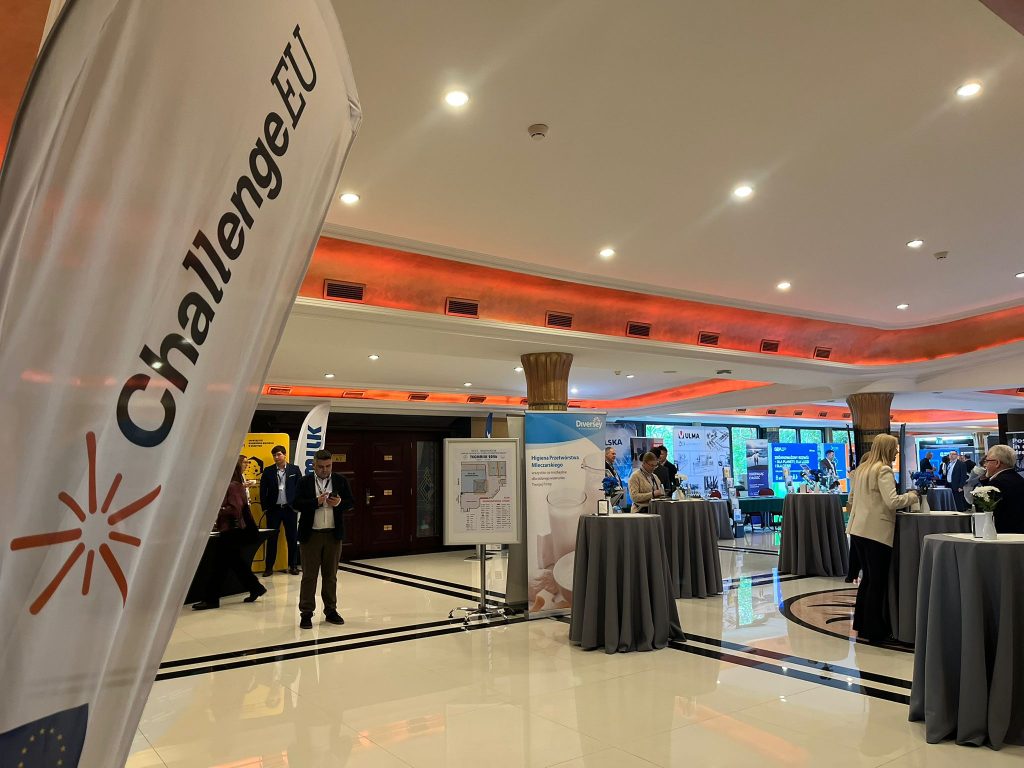
On 11–13 February, the 27th edition of the Techmilk seminar was organised by the University of Warmia and Mazury. The event is devoted to modern technological solutions in the dairy processing sector. During the seminar, science met industry. Techmilk brought together representatives of academia, business, local government authorities, and students – nearly 400 people attended the event in total. Through presentations, debates, and showcases of technical solutions, dialogue was established between scientists, representatives of dairy companies, and suppliers of modern industry solutions. “Techmilk was an excellent opportunity to promote the alliance’s ideas and establish new contacts. During the UWM Regional Meet-Up, we also met with our associated partners – including companies such as Mlekpol and Piątnica. We observed very strong interest in the ChallengeEU alliance, and many companies expressed their willingness to cooperate,” says Dr Adriana Łobacz, Market Officer in WP4. It is also worth noting that students from universities forming the ChallengeEU alliance were not forgotten during the event. Representatives of UWM’s Office for International Cooperation worked together with entrepreneurs to offer students opportunities for internships and traineeships.
M.A.R.K.E.T. Meet-Up on Events and Sustainability in the Region of Valencia
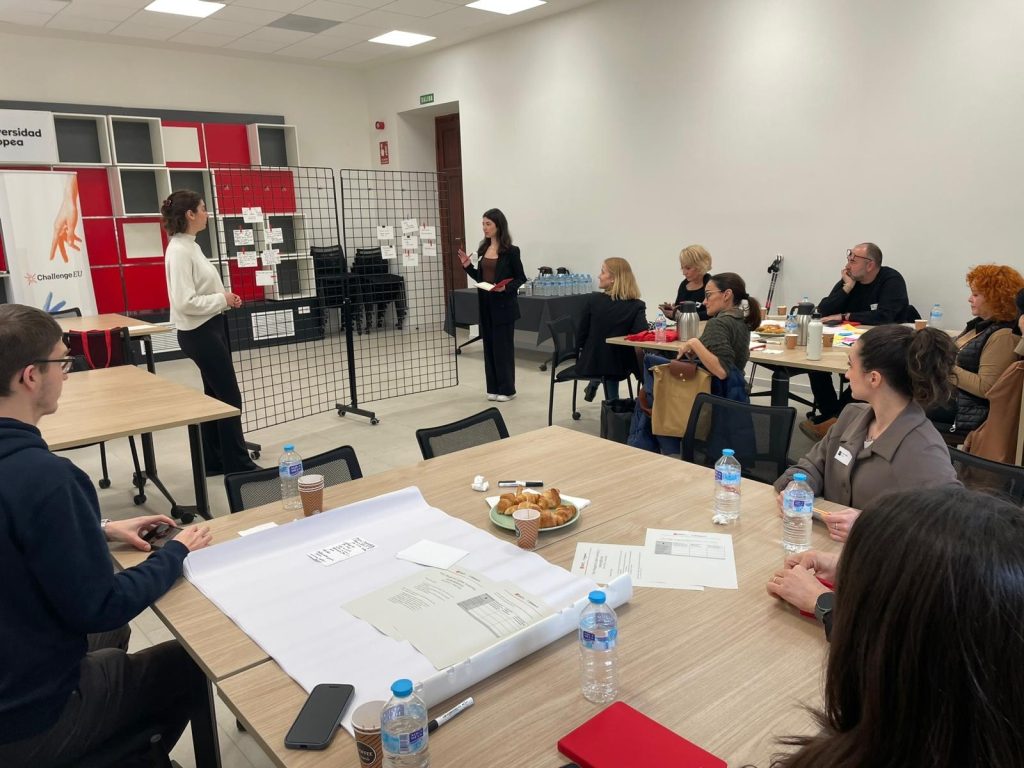
On Tuesday, February 10, 2026, Universidad Europea de Valencia hosted its first M.A.R.K.E.T. Meet-Up dedicated to Events and Sustainability in the Region of Valencia. Organized in collaboration with Meeting Professionals International (Iberian Chapter), this dynamic session brought together local experts representing the Quadruple Helix (Government, Industry, Academia and Civil Society) to explore how events can contribute to sustainability outcomes and create lasting legacies in destinations. This collaborative exercise featured insightful discussions on integrating sustainability into event planning and execution. It focused on identifying local challenges related to sustainable events and generating practical solutions to ensure that sustainability principles are embedded in future event strategies. Participants engaged in a lively exchange of ideas, emphasizing the importance of collaboration between event organizers, destinations, and stakeholders to achieve meaningful sustainability goals. The conversation highlighted actionable steps for reducing environmental impact, promoting local communities, and ensuring that events leave a legacy beyond the experience itself. Key Challenges Identified: Potential Solutions: “Thank you to all attendees and partners for making this event a success. Together, we are shaping a more sustainable future for the events industry in the region of Valencia and beyond,” said the organizers.
ChallengeEU Strategy Board defines next steps in Valencia
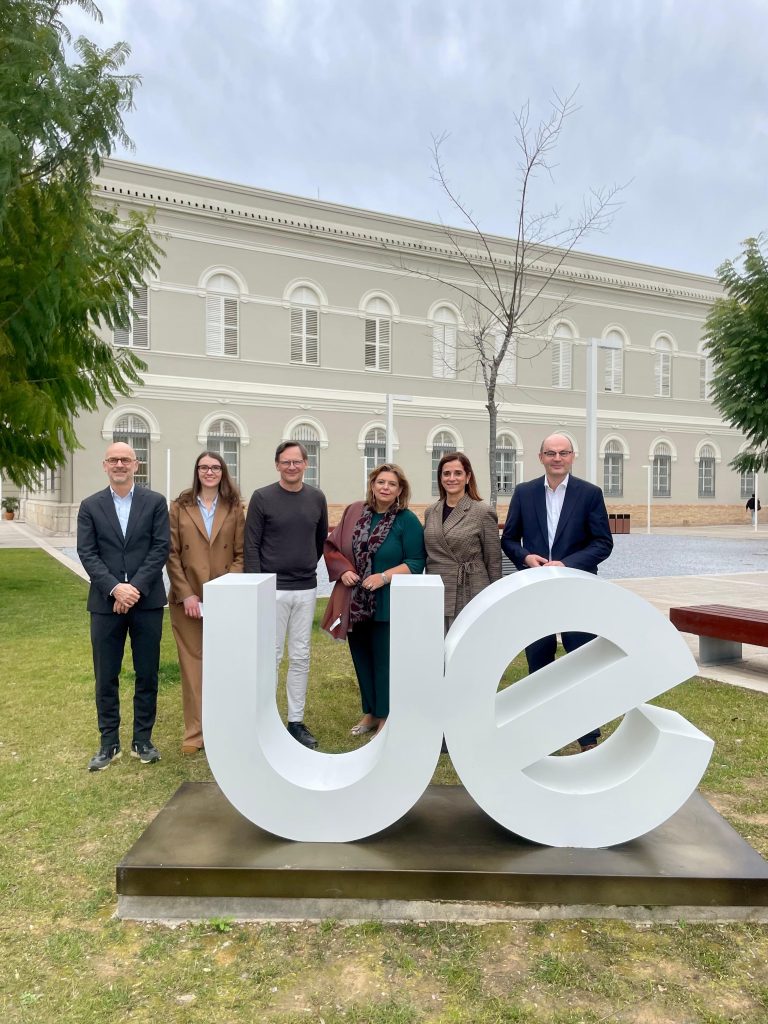
The Strategy Board, made up of the Rectors of the nine member universities, holds its meeting at the Turia Campus to take stock of the alliance’s first year and define future directions. On Tuesday (10 February), Universidad Europea de Valencia hosted the meeting of the ChallengeEU Strategy Board. This meeting brought together, at the Turia Campus, the rectors of the nine universities that make up the Alliance in a working session focused on future directions, strategic challenges and the evolution of the project. The day began with a welcome coffee, during which Dr Esther Gómez, Regional Secretary for Universities of the Generalitat Valenciana, gave a few words of institutional greeting to the Rectors of the alliance before starting the programme of activities. During the working session, the Strategy Board addressed the presentation of the results of the alliance’s first year of operation, as well as the analysis of the medium and long-term strategy, focused on consolidating the vision and priorities for the coming years. The meeting also allowed progress to be made on the proposal to create double degrees between member universities, as well as exploring the possible incorporation of a Ukrainian polytechnic university as an associate member, in line with ChallengeEU’s commitment to broader and more diverse European cooperation. The meeting was chaired by Prof. Tobias Hagen, Director General of ChallengeEU, and by the Secretary General, Sofiia Hecker, both from the University of Offenburg (Germany), the institution responsible for the overall coordination of the alliance. Dr Annette Klinkert, director of the technical agency that has accompanied ChallengeEU in its application and development process, also participated in the proceedings. The session also agreed that the Rector of the Universidade Europeia de Lisboa, Prof. Helia Gonçalves, will assume the chairmanship of the Strategy Board during the alliance’s second year of operation, replacing Prof. Stephan Trahasch, Rector of the Offenburg University of Applied Sciences (Germany). Likewise, the Rector of Mid Sweden University (Sweden), Docent Anders Fallström, has been appointed as the new Vice-President of the body. Two Student Council representatives at the Strategy Board – Hannah Rendle from Hochschule Offenburg and Keshini Nistar from ECAM LaSalle – held their final meeting in this role. Throughout their mandate, they actively contributed student perspectives to the Alliance’s highest decision-making body, ensuring that the student voice remained an integral part of strategic discussions. New Student Council representatives will soon be elected to continue representing students at the Strategy Board.
Student Journal: “One journey can change the way you see the world”
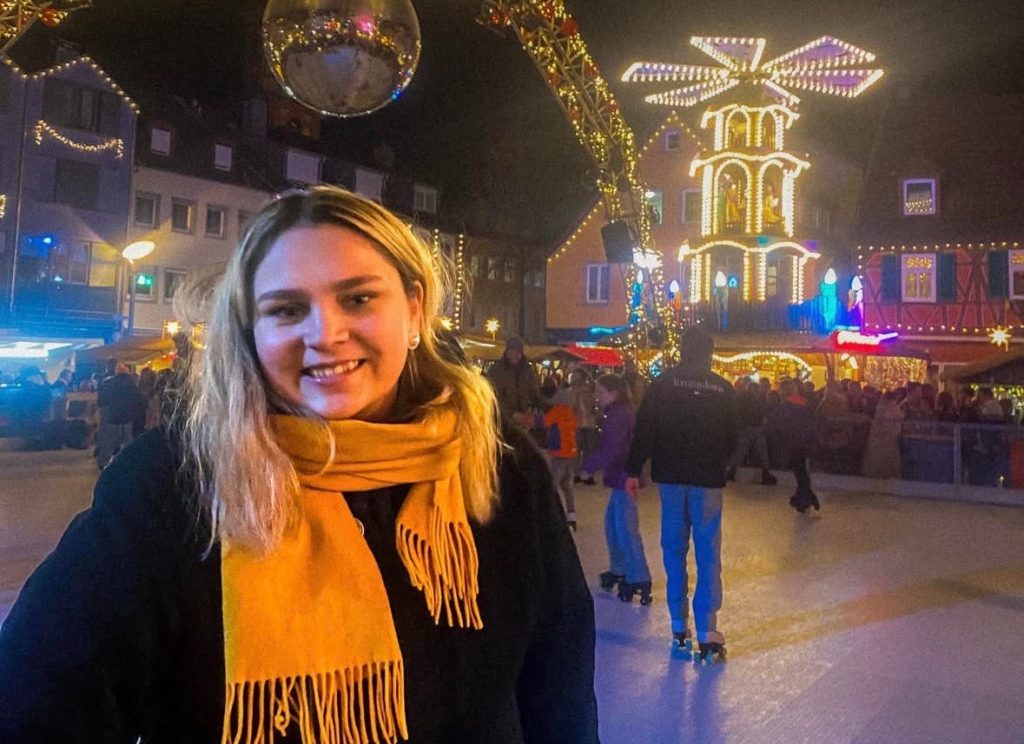
“Every journey begins with a step outside the comfort zone,” says Ieva, a ChallengeEU Ambassador from LBTU. In her video, she looks back on the memories from the meeting in Offenburg. Wyświetl ten post na Instagramie Post udostępniony przez @challengeeu.alliance
Student Journal: “It opened a new world for me”
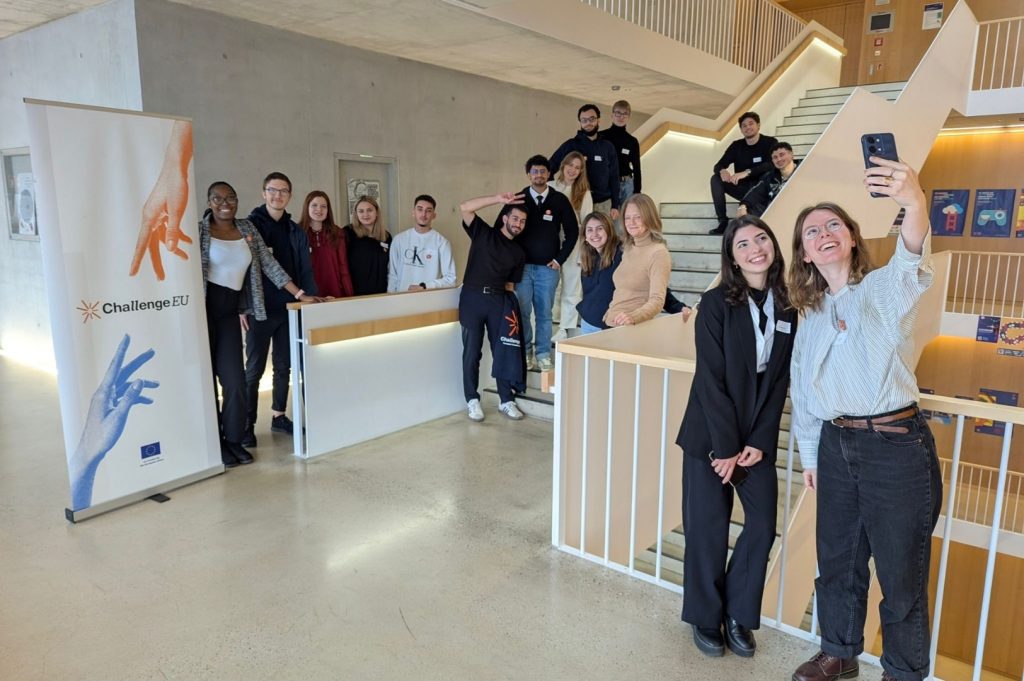
“Going to Offenburg and meeting the other ambassadors was definitely amazing as it opened a new world for me” – writes Georden Shaw from University of Warmia and Mazury, who took part in the ambassadors’ meeting at the HSO in Germany. Myself and two other ChallengeEU Ambassadors from UWM had the opportunity to participate in 1st Student Ambassadors Meeting that was held at Hochschule Offenburg, Germany from December 4-5, 2025. We embarked on our journey on December 3rd, from Warsaw to Frankfurt after which we took a train to Offenburg. We made our to our accommodation where were warmly greeted and welcomed by Zina Qabbani – Communications Officer WP6. She then took us to dinner at Brassiere Engel where we met with all the ambassadors. It was such a special evening filled with many introductions, laughter and many pictures/videos. Over the next 2 days, we had roughly 6-8 sessions which covered a formal introduction to ChallengeEU, a content creation and social media training, sharing of cultural experiences, intercultural communication and inclusive language workshop, creating content and lastly reflection exercises. Through these sessions, I learnt different skills in photography, way to create and post engaging content, what language is and is not inclusive among a myriad of things. These sessions were not only interactive but very insightful as we were able to explore and discuss various topics, concerns and ultimately create solutions which would aid in us ultimately achieving our goals as ChallengeEU ambassadors. Going to Offenburg and meeting the other ambassadors was definitely amazing as it open a new world for me. I love experiencing new cultures and getting the opportunity to network and connect with them was not only exciting but insightful as we shared how we were all honouring our responsibilities as ambassadors differently and this allowed us to learn from each other as well. Two of the most memorable moments from the trip were: Overall, the trip to Offenburg not only gave me intercultural connections but equipped myself and the other ambassadors with skills that will be extremely beneficial in us achieving our aim to “Challenge the Now. In Unity.” Georden Shaw, ChallenegeEU student ambassadors
Student Voices Shaping ChallengeEU: Meet Our Student Council
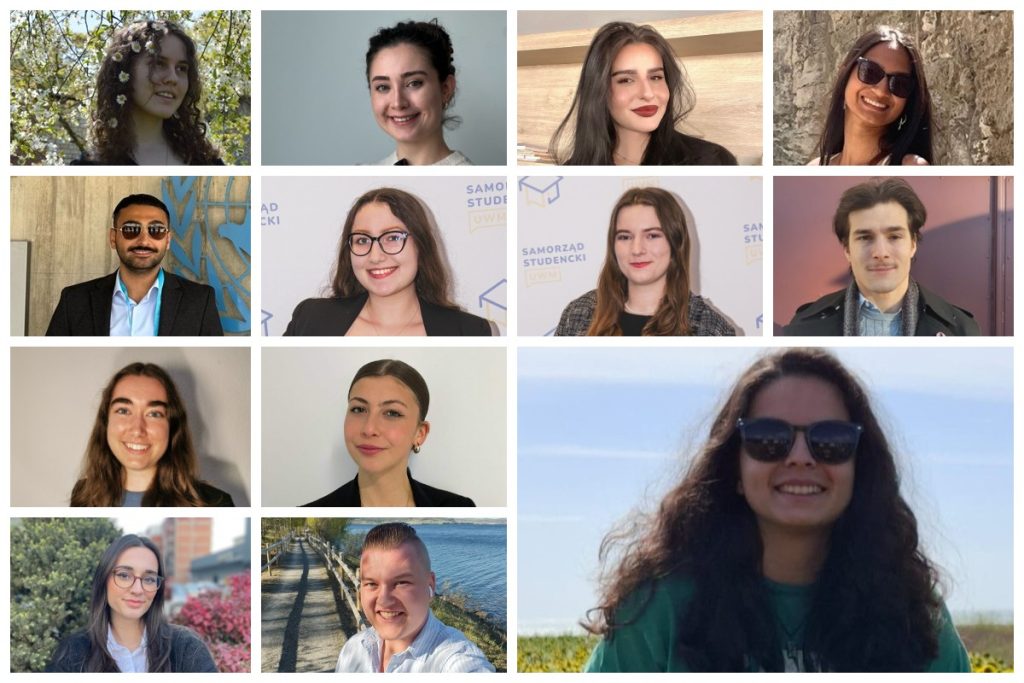
As the calendar year is coming to an end, we will soon say goodbye to the first composition of the Student Council (SCS). We would like to introduce the people who, over the past several months, have supported our Alliance and helped ensure that the student voice was clearly heard. With their student experience and positive energy, they have added one brick after another to the shared project we are building together: ChallengeEU. We are taking this opportunity to thank them for all their work so far. ChallengeEU Student Council (CSC) is the body where students will have the opportunity to shape the Alliance. In particular, the CSC will elaborate and represent students’ ideas, perspectives and feedback about the Alliance’s future development. Each partner university appoints two student representatives. Members are elected for one-year terms through the student associations of their home institutions and may be re-elected for a maximum of two terms. By simple majority, the members elect a President and a Vice-President for the duration of one term. The ChallengeEU Student Council (CSC) meets four times per year. In its decision-making, the Council strives to reach consensus. Where consensus cannot be achieved, decisions are taken by simple majority. The CSC also elects its representatives to the Alliance governance bodies: three representatives to the Strategy Board, two to the Management Board, and two to the ChallengeEU Academic Council. Rebecca Fernandes Paes Pinto Rocha, President CSC As an international PhD student that has studied in 3 different european universities up to my masters degree, ChallengeEU resonates with me and my experiences. That’s why getting involved in the Alliance was an obvious decision for me, specially as a student representative. As the president of the Student Council for the year 2025, I was challenged and able to grow alongside all students representatives. Together we set the base and started shaping the Student Council while working with boards, councils and staff of the Alliance to make the voice of students heard in all spheres. Iwona Pająk, Vice-President CSC I am a 5th-year psychology student at the University of Warmia and Mazury in Olsztyn. I have been actively involved in university life for many years, and I am currently the president of my student council – and I’m happy about it. In my free time, I enjoy reading books and traveling. Alketa Mustafi, representative SCS on the Management Board I’m a first-semester Master’s student in Finance, and I’ve always been curious about how things work – from numbers and strategies to people and ideas. Within ChallengeEU, I’m one of the two student representatives from the Student Council on the Management Board, which means I get to bring the student perspective into big decisions and make sure our voices actually shape the alliance. Beyond titles and roles, I’m someone who learns by doing, asking questions, and turning ideas into something real. I get energized by collaboration, new challenges, and being around people who think differently than me. ChallengeEU gives me the chance to do all of that – connect with amazing people, experiment, and see how far we can actually take an idea. And honestly? I’m here to push boundaries, make student voices matter, and have a little fun while doing it. Fabian Grönvik, Member of CSC I’m in my third year of social sciences studies, focusing on sociology. I believe ChallengeEU is a very impressive project of European integration with huge potential. We have a lot to learn from each other, both as academic knowledge and through cultural exchange. I’m proud to be part of the CSC to along with the others ensure that the student perspective is constantly present. Linda Priede, representative SCS on the Board Academic Council I have been actively involved in student life and the LBTU Student Council since the first year of my bachelor’s degree. Currently, I am studying for my second master’s degree in Project Management. With over six years of experience representing students’ opinions, I am still passionate about sharing the student perspective. That is why I continue to participate in student representation — this time as part of the ChallengeEU Student Council, serving on the Academic Council. It is a great experience to engage in discussions not only with students from different universities and countries but also with other university staff members. Gustav Månsson, Member of CSC I’m 21 years old, study business & economics and my inrest for party is almost as big as my intrest for educational policy. Keshini Nistar, representative SCS on the Strategy Board I’m a 4th-year Mechatronics Engineering student at ECAM LaSalle in Lyon France (Energy & Environmental Engineering track). I have joined the ChallengeEU alliance with the keen interest of contributing to cultural and international exchange in higher education. Being part of the student council and the Strategy Board, I am grateful and delighted to represent our students’ voices, ensuring they are at the heart of this alliance. I am indeed proud to represent ECAM LaSalle and to work with an amazing team of reps as well, ensuring that everyone has an opportunity to grow thanks to this wonderful initiative. I look forward to further participating and engaging with everyone is this alliance. Marija Kosovljanovic, Member of CSC I’m a full-time Business Administration student in my third semester, studying in Olten, Switzerland. I’m part of the Student Council and also a ChallengeEU Student Ambassador. I joined the Student Council because I wanted to get more involved in student life and help represent the voices of my fellow students. I enjoy working with others, supporting new ideas, and helping make our study environment a bit better for everyone. ChallengeEU is important to me because it connects students from different countries and backgrounds to work on real and meaningful challenges. I love the international exchange, the creative teamwork, and the chance to learn new perspectives. For me, it’s an opportunity to grow personally and academically while contributing to something that matters. Tina Adili, representative SCS on the Academic Council The internal

